Monthly Archives: November 2024
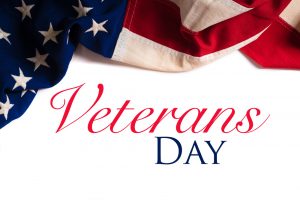 The name was originally Armistice Day, but now is known as Remembrance Day in the Commonwealth of England and Veterans Day in the United States. It is observed annually on November 11th. This day marks the armistice signed at Compiègne, France, between the Allies of World War I and Germany at 5:45am, leading to the end of hostilities on the Western Front, effective from 11:00am…the “eleventh hour of the eleventh day of the eleventh month” in 1918. Despite this, Thomas R Gowenlock, a US First Division intelligence officer, reported that shelling continued throughout the day, ceasing only at nightfall. The armistice, initially set for 36 days, required several extensions until the formal peace agreement with the Treaty of Versailles was signed the following year. In celebration of the day, “Legally, two minutes of silence is recommended to be observed at 2:11pm Eastern Standard Time.”
The name was originally Armistice Day, but now is known as Remembrance Day in the Commonwealth of England and Veterans Day in the United States. It is observed annually on November 11th. This day marks the armistice signed at Compiègne, France, between the Allies of World War I and Germany at 5:45am, leading to the end of hostilities on the Western Front, effective from 11:00am…the “eleventh hour of the eleventh day of the eleventh month” in 1918. Despite this, Thomas R Gowenlock, a US First Division intelligence officer, reported that shelling continued throughout the day, ceasing only at nightfall. The armistice, initially set for 36 days, required several extensions until the formal peace agreement with the Treaty of Versailles was signed the following year. In celebration of the day, “Legally, two minutes of silence is recommended to be observed at 2:11pm Eastern Standard Time.”
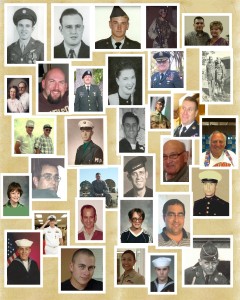
Originally set for November 11th annually, Veterans Day was shifted to the fourth Monday of October starting in 1971, due to the Uniform Monday Holiday Act. This change occurred on October 25, 1971; October 23, 1972; October 22, 1973; October 28, 1974; October 27, 1975; October 25, 1976, and October 24, 1977. However, in 1978, the observance was returned to its original date of November 11th, mainly because its date had significance too. Although the official holiday is still on November 11th, if it falls on a weekend, federal employees and various organizations observe the holiday on the adjacent Friday or Monday.
Veterans Day, the federal holiday in the United States, is observed annually on November 11th to honor military veterans from the United States Armed Forces. Veterans Day is distinct from Memorial Day, a US public holiday in May: Veterans Day commemorates the service of all US veterans, while Memorial Day specifically honors those who have died while in military service. Another military holiday that also occurs in May, Armed Forces Day, honors those currently serving in the US military. Additionally, Women Veterans Day is recognized by a growing number of US states that specifically honor women who have served in the US military.
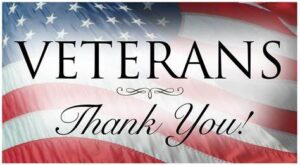
While the holiday is commonly printed as Veteran’s Day or Veterans’ Day in calendars and advertisements, the United States Department of Veterans Affairs website states that the attributive (no apostrophe) rather than the possessive case is the official spelling “because it is not a day that ‘belongs’ to veterans, it is a day for honoring all veterans.” I find that very informative, because I have always struggled with where that apostrophe was supposed to go…silly as that may sound. I like that it is actually no apostrophe to honor all veterans. So, to our veterans, Happy Veterans Day!!

 Ok, so you bought a car. You already know, I’m sure, that there are many things your car will need. You just hope that it will be…eventually. With the introduction of the automobile, came the need for parts…lots of parts. On of the parts that might seem insignificant…until it rains anyway, is the windshield wipers. Nevertheless, after those first cars were invented, and the rain, snow, and sleet moved in, the windshield wiper became very important. Enter Mary Anderson. Mary was a woman from Birmingham, Alabama, who came up with her “window cleaning device for electric cars and other vehicles to remove snow, ice or sleet from the window.” The product was very unique, and the patent office awarded US Patent Number 743,801 to Mary for her work. Upon receiving her patent, Anderson attempted to sell it to a Canadian manufacturer, but the firm declined, stating the device lacked prac9tical value and was not monetarily worthwhile. Despite mechanical windshield wipers becoming standard in passenger vehicles by approximately 1913, Anderson did not profit from her invention.
Ok, so you bought a car. You already know, I’m sure, that there are many things your car will need. You just hope that it will be…eventually. With the introduction of the automobile, came the need for parts…lots of parts. On of the parts that might seem insignificant…until it rains anyway, is the windshield wipers. Nevertheless, after those first cars were invented, and the rain, snow, and sleet moved in, the windshield wiper became very important. Enter Mary Anderson. Mary was a woman from Birmingham, Alabama, who came up with her “window cleaning device for electric cars and other vehicles to remove snow, ice or sleet from the window.” The product was very unique, and the patent office awarded US Patent Number 743,801 to Mary for her work. Upon receiving her patent, Anderson attempted to sell it to a Canadian manufacturer, but the firm declined, stating the device lacked prac9tical value and was not monetarily worthwhile. Despite mechanical windshield wipers becoming standard in passenger vehicles by approximately 1913, Anderson did not profit from her invention.
As the story goes, “on a freezing, wet winter day around the turn of the century, Mary Anderson was riding a streetcar on a visit to New York City when she noticed that the driver could hardly see through his sleet-encrusted front windshield. Although the trolley’s front window was designed for bad-weather visibility—it was split into parts so that the driver could open it, moving the snow- or rain-covered section out of his line of vision—in fact the multi-pane windshield system worked very poorly. It exposed the driver’s uncovered face (not to mention all the passengers sitting in the front of the trolley) to the inclement weather, and did not improve his ability to see where he was going in any case.”
Mary Anderson’s invention solved this problem for everyone. With a simple flip of a switch, the wipers kick in, and our windshields are clean and dry. Yes, they wear out sometimes, and many people would say that they 
 don’t last as long as they should, but try to do much driving in the rain or snow without them. Many parts, some much more expensive don’t last long either. It’s better to have a set of almost worn-out wiper blades than to have none at all. Many people would have expected an automobile invention to come from a man, but not in this case. So the next time you use your wiper blades, you can thank Mary.
don’t last as long as they should, but try to do much driving in the rain or snow without them. Many parts, some much more expensive don’t last long either. It’s better to have a set of almost worn-out wiper blades than to have none at all. Many people would have expected an automobile invention to come from a man, but not in this case. So the next time you use your wiper blades, you can thank Mary.
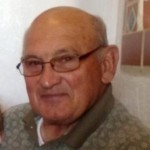
 Our uncle, Butch Schulenberg is a man who cares deeply about the things he loves. He is a family man, who is always there for his wife and kids…going above and beyond for them in everything from their health to their kids’ school activities. These past few years, he has been caring for his wife of 58 years, Charlys, who suffered a burn a while back, but is doing quite well under Butch’s care and that of their grandson, Christian Schulenberg, a CNA at the Forsyth Nursing Home, who lives with them. Having Christain there gives them extra help, when he isn’t working. I am so thankful that Charlys is doing well. She is so sweet, and we want to keep her with us for a long time. Butch has been an excellent caregiver.
Our uncle, Butch Schulenberg is a man who cares deeply about the things he loves. He is a family man, who is always there for his wife and kids…going above and beyond for them in everything from their health to their kids’ school activities. These past few years, he has been caring for his wife of 58 years, Charlys, who suffered a burn a while back, but is doing quite well under Butch’s care and that of their grandson, Christian Schulenberg, a CNA at the Forsyth Nursing Home, who lives with them. Having Christain there gives them extra help, when he isn’t working. I am so thankful that Charlys is doing well. She is so sweet, and we want to keep her with us for a long time. Butch has been an excellent caregiver.
Uncle Butch is a sports fan, from his own days as a football player, I’m sure. He is what would be called a booster. He supports every sport his grandchildren play in, as well as every sport of his hometown, Forsyth,  Montana. He may not be able to get to every game, but he knows who won and by how much. He is an encouragement to the teams…win or lose. Of course, he wants them to win, but in sports, there is just as much importance in sportsmanship as there is in victory. A poor winner is as bad as a poor loser. Sports is about being the best team they can be and knowing that not every game will be won. Nevertheless, every player in the small town of Forsyth, Montana knows that Butch Schulenberg supports their hard work.
Montana. He may not be able to get to every game, but he knows who won and by how much. He is an encouragement to the teams…win or lose. Of course, he wants them to win, but in sports, there is just as much importance in sportsmanship as there is in victory. A poor winner is as bad as a poor loser. Sports is about being the best team they can be and knowing that not every game will be won. Nevertheless, every player in the small town of Forsyth, Montana knows that Butch Schulenberg supports their hard work.
In the summer months, when school is out, Butch can usually be found in his yard growing the sweetest little flower garden. He loves yard work, and while the place he lives has a crew that maintains the grounds, they know that Butch Schulenberg will likely be mowing his area of the lawn. He loves to take pictures of his flowers so we can all enjoy them, and he also loves to take pictures of the beautiful sunsets over the Yellowstone River near their home. They live high up 
 above the river on a bit of a bluff, and the view down to the river is spectacular, sunset or not. Whenever they can, they like to visit their kids, Andi Kay, Tadd, and Heath at their homes, or have the kids come for visits. Their grandchildren are the collective apple of their eye. They love them unconditionally and support them in all they do. People just couldn’t be more blessed than having people like Butch and Charlys as their parents and grandparents. Today is Uncle Butch’s 84th birthday. Happy birthday Uncle Butch!! Have a great day!! We love you!!
above the river on a bit of a bluff, and the view down to the river is spectacular, sunset or not. Whenever they can, they like to visit their kids, Andi Kay, Tadd, and Heath at their homes, or have the kids come for visits. Their grandchildren are the collective apple of their eye. They love them unconditionally and support them in all they do. People just couldn’t be more blessed than having people like Butch and Charlys as their parents and grandparents. Today is Uncle Butch’s 84th birthday. Happy birthday Uncle Butch!! Have a great day!! We love you!!
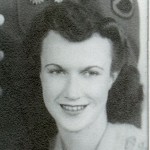
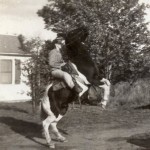 Aunt Ruth Wolfe grew up on a farm surrounded by horses…her absolute favorite animal. The country girl lifestyle suited her. During World War II, while her brother, my father Allen Spencer, served in the Army Air Forces, she worked the farm with her mother brother, Bill. She took on the farm work and also worked as a welder in the shipyards, becoming one of the Worl War II’s well known “Rosie the Riveters.” Later, married to my Uncle Jim Wolfe, they lived in the country near Casper, Wyoming…gardening, canning, and raising farm animals. Aunt Ruth was a capable woman, achieving anything she set her
Aunt Ruth Wolfe grew up on a farm surrounded by horses…her absolute favorite animal. The country girl lifestyle suited her. During World War II, while her brother, my father Allen Spencer, served in the Army Air Forces, she worked the farm with her mother brother, Bill. She took on the farm work and also worked as a welder in the shipyards, becoming one of the Worl War II’s well known “Rosie the Riveters.” Later, married to my Uncle Jim Wolfe, they lived in the country near Casper, Wyoming…gardening, canning, and raising farm animals. Aunt Ruth was a capable woman, achieving anything she set her 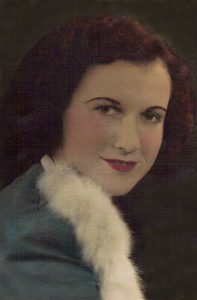 mind to. Her talents were many, ranging from the hard work of farming and canning to playing musical instruments and painting.
mind to. Her talents were many, ranging from the hard work of farming and canning to playing musical instruments and painting.
One of the most unexpected decisions Aunt Ruth and Uncle Jim made was moving to Vallejo, California. It’s surprising that someone who loved country living would choose a city. Vallejo, a suburb of San Francisco, is a sharp contrast to Casper, Wyoming, and Holyoke, Minnesota, where Aunt Ruth grew up. Perhaps they just wanted a change, which I get since my family transitioned from rural to urban living in Casper. Still, I can see the draw of city life and California’s milder climate probably better suited my aunt and uncle.
After living in California for a while, the country life drew them back to the mountains of Washington state. The move to the mountains didn’t surprise me much; country living seemed to be in my aunt and uncle’s blood, as much a part of their being, as their DNA. Once they settled in eastern Washington, they stayed put. They purchased a mountaintop 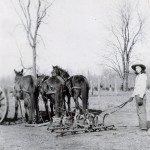
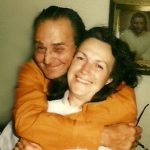 and built three cabins: one for themselves, one for their daughter Shirley and her husband Shorty Cameron, and one for their son Terry and his family. For Aunt Ruth and Uncle Jim, this was their final abode. Having visited their mountaintop, I understand its allure, but since moving back to town, I’ve realized I wouldn’t want to live in the countryside or on a mountaintop permanently. Nonetheless, it was their safe haven. Today would have marked Aunt Ruth’s 99th birthday. Happy birthday in Heaven, Aunt Ruth. We love and miss you very much.
and built three cabins: one for themselves, one for their daughter Shirley and her husband Shorty Cameron, and one for their son Terry and his family. For Aunt Ruth and Uncle Jim, this was their final abode. Having visited their mountaintop, I understand its allure, but since moving back to town, I’ve realized I wouldn’t want to live in the countryside or on a mountaintop permanently. Nonetheless, it was their safe haven. Today would have marked Aunt Ruth’s 99th birthday. Happy birthday in Heaven, Aunt Ruth. We love and miss you very much.
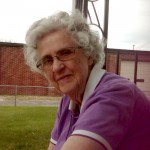
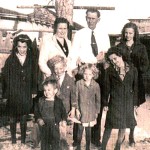 As a toddler, my aunt, Evelyn Hushman was learning how to properly address her adult relatives. Each time she referred to an aunt or uncle by their first name, her parents would remind her, “You must say Uncle Ted or Aunt Gladys.” This instruction was likely repeated often, as it’s challenging for a toddler to understand why they must use a different title when everyone else uses the person’s first name. It’s a perplexing period for a young child who is just starting to understand social norms.
As a toddler, my aunt, Evelyn Hushman was learning how to properly address her adult relatives. Each time she referred to an aunt or uncle by their first name, her parents would remind her, “You must say Uncle Ted or Aunt Gladys.” This instruction was likely repeated often, as it’s challenging for a toddler to understand why they must use a different title when everyone else uses the person’s first name. It’s a perplexing period for a young child who is just starting to understand social norms.
These days, at least in our family, many of the aunts and uncles go by just their first names, and while some people might think that odd, I am just as comfortable being Caryn as I am Aunt Caryn. We don’t consider it to be any kind of a show of disrespect. But in times past, and in many families today, if the person is an aunt or uncle, you must address them as Aunt this or Uncle that. We do draw the line at grandma and grandpa, and my grandchildren know that while Gma, G, or G-mamma is ok, Caryn is not. I suppose that could be confusing to 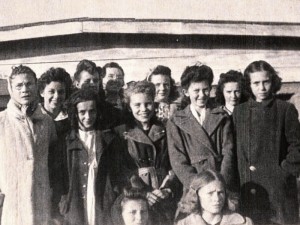 little kids too, but that is the way it is. Another place where we draw the line is Mommy and Daddy, or Mom and Dad. But for the aunts and uncles we are a little more casual.
little kids too, but that is the way it is. Another place where we draw the line is Mommy and Daddy, or Mom and Dad. But for the aunts and uncles we are a little more casual.
Aunt Evelyn was an incredibly social person with a close-knit circle of friends who formed a club. This group consisted of eight girls and eight boys, and their parents would rotate hosting parties for them. They were the envy of all the siblings, who longed to be old enough to join in. When it was my grandmother’s turn, she organized the gathering at the North Casper Clubhouse for a Taffy Pulling Party. A few parents were present, but the event was primarily for the sixteen club members, with younger children excluded, though they did receive some taffy afterwards. The party was a resounding success, leaving my grandmother delighted with the outcome. It’s likely that the younger siblings aspired to have such friendships when they grew up, but Aunt Evelyn’s club was truly one of a kind.
My Aunt Evelyn was the oldest among my mother’s siblings. She and my mother often went on double dates 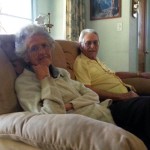
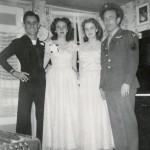 during the time my parents were dating. Aunt Evelyn and Uncle George had been married for about five years then. Despite the eight-year age difference, the sisters shared a close friendship. My father and Uncle George were also friends, making double dating a natural choice for them. They joined a bowling league together, turning their double dates into a cherished weekly tradition that lasted for years and years. They were nights that my sisters and I fondly recall. Today would have been Aunt Evelyn’s 96th birthday. Happy birthday in Heaven, Aunt Evelyn. We love and miss you very much.
during the time my parents were dating. Aunt Evelyn and Uncle George had been married for about five years then. Despite the eight-year age difference, the sisters shared a close friendship. My father and Uncle George were also friends, making double dating a natural choice for them. They joined a bowling league together, turning their double dates into a cherished weekly tradition that lasted for years and years. They were nights that my sisters and I fondly recall. Today would have been Aunt Evelyn’s 96th birthday. Happy birthday in Heaven, Aunt Evelyn. We love and miss you very much.

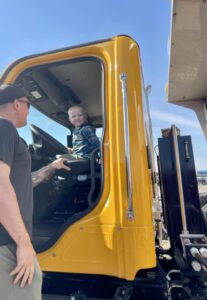 My great grandnephew, Asa Balcerzak is a sweet little three-year-old, who is all boy. He likes trucks, motorcycles, and Grandpa Dave Balcerzak’s hot rod, but he also has a softer side…at least when it comes to kittens and other pets. I think Asa is very much his daddy, Keifer’s boy, but he also loves his mommy, Katie and sister, Reece very much too. Recently, his family made a trip to the Corn Maze in town. It was a big family thing, with lots of extra family members there too. There were rides and games, lots of things to see and do, and one big chair for picture taking.
My great grandnephew, Asa Balcerzak is a sweet little three-year-old, who is all boy. He likes trucks, motorcycles, and Grandpa Dave Balcerzak’s hot rod, but he also has a softer side…at least when it comes to kittens and other pets. I think Asa is very much his daddy, Keifer’s boy, but he also loves his mommy, Katie and sister, Reece very much too. Recently, his family made a trip to the Corn Maze in town. It was a big family thing, with lots of extra family members there too. There were rides and games, lots of things to see and do, and one big chair for picture taking.
Like many little kids these days, Asa likes the two wheeled bikes. When I was a kid, three might have been the age to receive a tricycle, but these kids can and do ride two wheelers, 
 and even drive motorized cars, without running into everything in sight. I guess that with technology, comes the advancement of their abilities too. These kids know how to work a tablet, phone, and probably a computer too. Sometimes I am just amazed. The computer stuff doesn’t really shock me too much, because Asa’s dad is a computer programmer by trade, so why should his kid be different.
and even drive motorized cars, without running into everything in sight. I guess that with technology, comes the advancement of their abilities too. These kids know how to work a tablet, phone, and probably a computer too. Sometimes I am just amazed. The computer stuff doesn’t really shock me too much, because Asa’s dad is a computer programmer by trade, so why should his kid be different.
Asa has a great smile. I always think that when he smiles, his whole face smiles. Not everyone is that way, but Asa and his sister definitely are two of those people. Reese is so proud of her little brother, and they are so sweet together. I’m sure there are fights. All siblings fight sometimes, but they get along very well. I think Reece was very excited to get a baby 
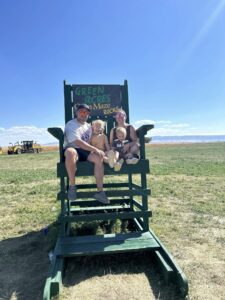 brother. She was all smiles. I’m sure she wanted him to play right away, but that had to wait. Now, playtime is here, and they love having a sibling…even though their interests are quite different. Reece is a girly girl, and Asa is definitely all boy. Nevertheless, she watches out for her little brother, and I’m sure he will watch out for her when he is a little older.
brother. She was all smiles. I’m sure she wanted him to play right away, but that had to wait. Now, playtime is here, and they love having a sibling…even though their interests are quite different. Reece is a girly girl, and Asa is definitely all boy. Nevertheless, she watches out for her little brother, and I’m sure he will watch out for her when he is a little older.
It’s hard to believe that Asa is three years old already. It seems like he was just born yesterday, but her we are at the milestone between toddler and little boy. It’s amazing…they are a baby and then a toddler, and suddenly…they are a little boy. Before we know it he will be a grown man. For now though, he is a little boy. Today is Asa’s 3rd birthday. Happy birthday Asa!! Have a great day!! We love you!!

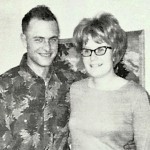 Our uncle, Eddie Hein, was always a man you could count on. He was hard working and always willing to help someone in need. He would even travel to help. When my in-laws, Walt and Joann Schulenberg, were building their house in Homa Hills, Eddie came down from Forsyth, Montana to Casper, Wyoming to help lay the cinder blocks. It was a big job, and while the whole family helped out, we didn’t really know how to lay brick. My father-in-law and his brother, Eddie did. I suppose we would have finished the house one way or the other, but it would have taken a lot longer.
Our uncle, Eddie Hein, was always a man you could count on. He was hard working and always willing to help someone in need. He would even travel to help. When my in-laws, Walt and Joann Schulenberg, were building their house in Homa Hills, Eddie came down from Forsyth, Montana to Casper, Wyoming to help lay the cinder blocks. It was a big job, and while the whole family helped out, we didn’t really know how to lay brick. My father-in-law and his brother, Eddie did. I suppose we would have finished the house one way or the other, but it would have taken a lot longer.
Eddie was that way with everyone. If people called, he did his best to help. I’m certain that when he passed 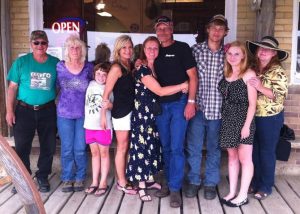
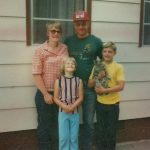 away, on October 16, 2019, the loss to the town of Forsyth was deeply felt. I know it was deeply felt in our family…not because of what Eddie might do for us, but for who he was. Eddie wasn’t just the guy who could get the job done, he was kind and caring, a friend to all who knew him, and a wonderful family man. He was very close to his children, Larry Hein and Kim Arani, his grandkids, Dalton Hein and Destiny Wallace, and of course, his loving wife, Pearl, of 52 years at the time of his passing. His family always knew that they were his priority.
away, on October 16, 2019, the loss to the town of Forsyth was deeply felt. I know it was deeply felt in our family…not because of what Eddie might do for us, but for who he was. Eddie wasn’t just the guy who could get the job done, he was kind and caring, a friend to all who knew him, and a wonderful family man. He was very close to his children, Larry Hein and Kim Arani, his grandkids, Dalton Hein and Destiny Wallace, and of course, his loving wife, Pearl, of 52 years at the time of his passing. His family always knew that they were his priority.
Eddie worked at Peabody coal mine in Colstrip, Montana until his retirement. He was well respected and loved by bosses and coworkers alike. They always knew that if Eddie Hein was on the job, he would give it his full 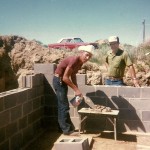
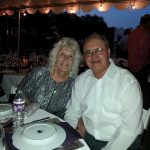 attention and full effort. He worked hard, and very much earned his retirement. Anyone who worked in mining can attest to that for sure. After his retirement, Eddie and Pearl loved to relax at their home in Forsyth, visit their daughter Kim and her husband Michael, in Texas, and I’m sure Eddie pitched in at Larry’s shop too. Unfortunately, all that was cut short by a stroke, and later the heart attack that took Eddie’s life in 2019. That was such a sad day for all of us. Today would have been Eddie’s 81st birthday. Happy birthday in Heaven, Eddie. We love and miss you very much.
attention and full effort. He worked hard, and very much earned his retirement. Anyone who worked in mining can attest to that for sure. After his retirement, Eddie and Pearl loved to relax at their home in Forsyth, visit their daughter Kim and her husband Michael, in Texas, and I’m sure Eddie pitched in at Larry’s shop too. Unfortunately, all that was cut short by a stroke, and later the heart attack that took Eddie’s life in 2019. That was such a sad day for all of us. Today would have been Eddie’s 81st birthday. Happy birthday in Heaven, Eddie. We love and miss you very much.
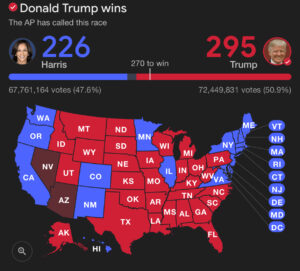 Yesterday, Americans went to the polls to elect our next president. We do this every four years, and whether your candidate wins or loses, it is a right that belongs to every US citizen over the age of 18 years. It isn’t a right that should be taken lightly. There are nations who do not have this right…and unfortunately, there are people who don’t vote and therefore forfeit their right. I understand that many people thing that their vote doesn’t matter, but every vote matters…every vote counts. I don’t care if you live in a state that is so completely red or so completely blue that you don’t think that your vote could possibly make a difference, it can. Change often happens slowly, but when enough people see a need for change, and they vote, change eventually happens. Take for example the states that flipped from Democrat to Republican in this election. People wanted change, and they went out to vote so they could get it.
Yesterday, Americans went to the polls to elect our next president. We do this every four years, and whether your candidate wins or loses, it is a right that belongs to every US citizen over the age of 18 years. It isn’t a right that should be taken lightly. There are nations who do not have this right…and unfortunately, there are people who don’t vote and therefore forfeit their right. I understand that many people thing that their vote doesn’t matter, but every vote matters…every vote counts. I don’t care if you live in a state that is so completely red or so completely blue that you don’t think that your vote could possibly make a difference, it can. Change often happens slowly, but when enough people see a need for change, and they vote, change eventually happens. Take for example the states that flipped from Democrat to Republican in this election. People wanted change, and they went out to vote so they could get it.
Of course, sometimes things have to get so bad that if makes people go out to vote. That can be the hardest part, because things do have to get pretty bad. Nevertheless, the people living in this era were born “for such a time as this.” We may not know it, but it is the truth. Each of us has face the times we are in, and we have decided whether we like what is going on or not. Then we act…but only if we get out and vote. Being angry, frustrated, or just done with it, will not create change. Only voting can do that…well, voting and much prayer. I’m sure you can tell which side of the coin I fall on, and that’s ok. I may be for one side or the other, but I firmly believe that people from both sides have a say, and a right to choose. 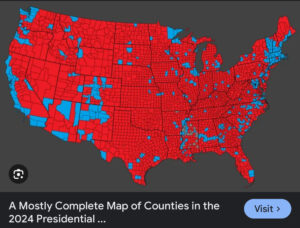
Of course, along with the right to vote, comes the right not to vote, and that too, is your right, but in my opinion, that is not the best way to go. My candidate may or may not win, as president, or any other office, but by voting, I have had my say in the matter. Sometimes, a win that is completely unexpected happens, because the voters turn out. You have tremendous power. That vote carries weight. It says, “I am making a stand!! This is how I see things…like it or not!! It’s my vote…and mine alone!! No one can make me vote one way or the other…or at all, but if I don’t vote, my voice is silenced.”
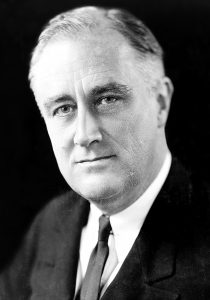
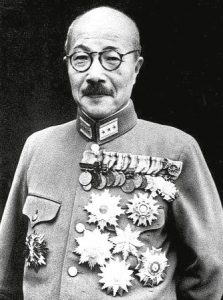 As with any attack, planning must be done before any action can take place. The attack on Pearl Harbor was no exception. A little more than a month, on November 5, 1941, the Combined Japanese Fleet received Top-Secret Order Number 1, stating that in just over a month, Pearl Harbor, along with Malaya (now Malaysia), the Dutch East Indies, and the Philippines, was to be bombed. There was much preparation to do, and very little time to do it. Failure would not be an option, because failure would mean death, and in fact, the battle was a planned death for the kamikaze pilots.
As with any attack, planning must be done before any action can take place. The attack on Pearl Harbor was no exception. A little more than a month, on November 5, 1941, the Combined Japanese Fleet received Top-Secret Order Number 1, stating that in just over a month, Pearl Harbor, along with Malaya (now Malaysia), the Dutch East Indies, and the Philippines, was to be bombed. There was much preparation to do, and very little time to do it. Failure would not be an option, because failure would mean death, and in fact, the battle was a planned death for the kamikaze pilots.
The problem was that the relationship between the United States and Japan had rapidly worsened following Japan’s occupation of Indochina in 1940 and the subsequent threat to the Philippines, which is an American territory. With the seizure of the Cam Ranh naval base, located roughly 800 miles from Manila, something had to be dome. In response, the United States seized all Japanese assets within its borders and shut the Panama Canal to Japanese shipping. In September 1941, President Roosevelt, with a statement prepared by British Prime Minister Winston Churchill, warned that the United States would go to war with Japan if it continued to invade territories in Southeast Asia or the South Pacific. The United States hoped, and yes even expected the Japanese to comply.
Nevertheless, despite ongoing negotiations between the United States Secretary of State and his Japanese counterpart to alleviate tensions, Hideki Tojo, the War Minister soon to become Prime Minister, was not inclined to retreat from occupied territories. Viewing the American “threat” of war as an ultimatum, he readied to initiate the first strike in a confrontation with the United States…the attack on Pearl Harbor.
We all know what happened next, but could it have been prevented? I don’t believe that Japan had any interest in preventing a war with the United States. So, it would have been up to the United States to pave the way for peace between the two countries…if that was even possible. Since I don’t believe it was possible, due to Japan’s plans, The other aspect of the question is how America might have prevented Pearl Harbor. It is likely that intelligence shortcomings and underestimation of the Japanese played a role. However, it is argued that the American military hawks and President Franklin Delano Roosevelt may have seen the attack as a necessary catalyst to persuade the nation to enter the war against the tyrannies of Nazi Germany and Imperial Japan. I don’t know for sure, and I hate to say that was exactly it, but I wonder if they expected the attack to be as bad as it ended up being.
Numerous theories speculate on whether Roosevelt, or even Great Britain’s Winston Churchill, had foreknowledge of the impending attack. However, it seems improbable. Military leaders typically do not permit such attacks due to the unpredictability of the consequences. Consider the possibilities: the attack occurring prematurely and sinking the carriers, the destruction of oil facilities, or the Japanese invasion and occupation of Hawaii. These are risks that no military leader would willingly take, regardless of their desire for a pretext to enter the war. It is probable that Roosevelt anticipated an attack, although the specifics of when and where remained uncertain.
To address the question of how America could have avoided Pearl Harbor, one must dig deeper into history, far beyond the oil embargoes of the early 1940s. It could be argued that the path to Pearl Harbor was set as early as July 8, 1853, when American Commodore Matthew Perry entered Tokyo Bay with his four ships, aiming to reestablish regular trade between Japan and the Western world. It all seemed innocent enough, but while Japan was once receptive to Portuguese, Spanish, and Dutch influences. Then, with each nation attempting to introduce Western culture and religion, Japan began to have issues with them. Within a few decades, these Western powers were expelled, leaving only the Dutch with limited trading privileges through Dejima, a small man-made island in Nagasaki.
The Japanese quickly assimilated the practices of their adversaries, which included adopting a Western-trained military. The Army was advised by the French and later the Germans, while the Navy was guided by British advisors and equipped with British-built warships. Japan managed to defeat its long-standing rival China, annexing Taiwan and Korea into its gradually expanding empire. In 1904-1905, Japan, was hardly a regional power a mere fifty years prior, overwhelmed Imperial Russia in a fierce conflict. The victory followed a surprise assault on the Russian Navy at Port Arthur…something that American military planners in 1941 should have taken notice of! The initial attack aimed to incapacitate the Russians, yet the pivotal battle occurred at Tsushima Straits, where Admiral Togo Heihaciro led the Japanese fleet to obliterate eight Russian battleships.
In World War I, which followed less than ten years later, Japan joined with the Russians and aided the British in seizing the German-held Tsingtao in China. Japan also took control of the Marianas, the Caroline Islands, and the Marshall Islands. All this further fueled Japan’s ambitions concerning Chinese territories and the American-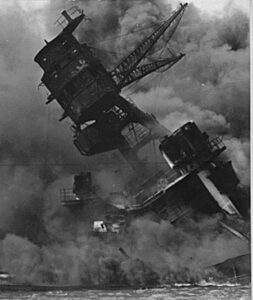
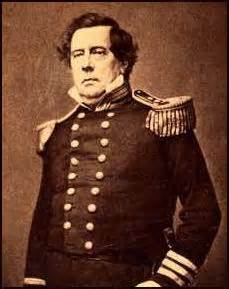 controlled Philippines for potential expansion. Then, came “the straw that broke the camel’s back” for the Americans, and with the threat against the Philippines, the attack of Pearl Harbor was set in motion…all due to the actions taken to protect the Philippines.
controlled Philippines for potential expansion. Then, came “the straw that broke the camel’s back” for the Americans, and with the threat against the Philippines, the attack of Pearl Harbor was set in motion…all due to the actions taken to protect the Philippines.
Had Perry not “opened” Japan, this sequence of events might not have unfolded. This is not to imply Japan would not have modernized, but the trajectory could have been altered. Without the Emperor’s restoration, the Boshin War might not have taken place, possibly preventing the swift military reforms that followed. Of course, all this could be speculation, but the experts think it is fact.

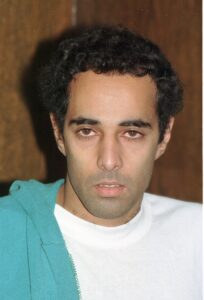 Israeli Prime Minister Yitzhak Rabin was fatally shot after attending a peace rally in Tel Aviv’s Kings Square, Israel on November 4, 1995. He succumbed to his injuries during surgery at Ichilov Hospital in Tel Aviv. The assassination occurred as Rabin was leaving the rally. The killer was Yigal Amir, who was against the Oslo Accords. The rally, held at Kings of Israel Square (now Rabin Square), supported the peace agreement. As Rabin descended the city hall steps towards his car, Amir fired three shots with a semi-automatic pistol. Two bullets struck Rabin, while the third slightly wounded Yoram Rubin, Rabin’s bodyguard. Rabin was rushed to Ichilov Hospital but passed away curing surgery, due to blood loss and lung damage.
Israeli Prime Minister Yitzhak Rabin was fatally shot after attending a peace rally in Tel Aviv’s Kings Square, Israel on November 4, 1995. He succumbed to his injuries during surgery at Ichilov Hospital in Tel Aviv. The assassination occurred as Rabin was leaving the rally. The killer was Yigal Amir, who was against the Oslo Accords. The rally, held at Kings of Israel Square (now Rabin Square), supported the peace agreement. As Rabin descended the city hall steps towards his car, Amir fired three shots with a semi-automatic pistol. Two bullets struck Rabin, while the third slightly wounded Yoram Rubin, Rabin’s bodyguard. Rabin was rushed to Ichilov Hospital but passed away curing surgery, due to blood loss and lung damage.
Yigal Amir, a 27-year-old Jewish law student, was linked to the far-right Jewish group Eyal. He was arrested by Israeli police at the scene of the shooting and subsequently confessed to the assassination. During his arraignment, he explained that he killed Prime Minister Rabin because the prime minister wanted “to give our country to the Arabs.” Amir was apprehended on the spot and later sentenced to life in prison.
Yitzhak Rabin, who was born in Jerusalem, played a pivotal role in the Arab-Israeli War of 1948 and was the chief-of-staff for Israel’s armed forces during the Six-Day War in 1967. Following his tenure as Israel’s ambassador to the United States, he joined the Labour Party and was elected prime minister in 1974. During his term, he led negotiations resulting in the 1974 ceasefire with Syria and the 1975 military disengagement agreement with Egypt. Rabin resigned from his position in 1977 due to a scandal related to maintaining bank 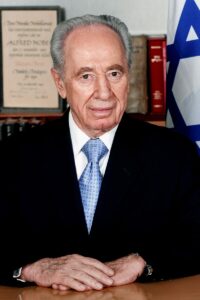
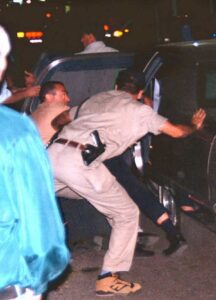 accounts in the United States, contrary to Israeli law. He later served as the defense minister of his country from 1984 to 1990.
accounts in the United States, contrary to Israeli law. He later served as the defense minister of his country from 1984 to 1990.
Then, in 1992, Rabin was the leader of the Labour Party, taking them to an electoral victory. Once again, he became the Prime Minister of Israel. The following year, he signed the landmark Israeli-Palestinian Declaration of Principles alongside Palestinian leader Yasser Arafat, and in 1994, they reached a formal peace agreement. In October of that year, Rabin, Arafat, and Israeli Foreign Minister Shimon Peres were jointly awarded the Nobel Peace Prize. Tragically, Rabin was assassinated in 1995. Shimon Peres, who was serving as Israel’s Foreign Minister at the time, was appointed Acting Prime Minister after an emergency cabinet meeting. It was such an unnecessary attack.

